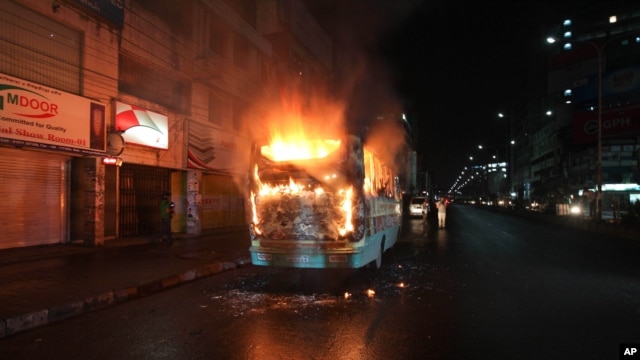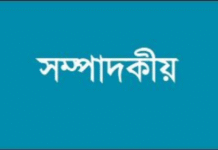FILE – A bus stands in flames after it was set afire by opposition supporters trying to defy a ban on protests, in Dhaka, Bangladesh, Oct. 25, 2013.
A clash of ideologies has plunged Bangladesh into a cycle of violence as the two main political parties – the ruling Awami League, led by Prime Minister Sheikh Hasina, and the Bangladesh National Party (BNP), headed by Begum Khaleda Zia, exploit the tension between secularists and Islamists ahead of elections.
Recently, Bangladesh’s main opposition party refused a request from the prime minister to form an all-party government to oversee upcoming elections, setting the stage for a showdown this week that could delay or even derail the polls altogether.
The deadlock in many ways recalls the aborted polls of 2007, when a League boycott and clashes between rival party supporters led a military-backed government to take over for two years.
Even if the polls go ahead, the opposition might reject the results, which could spark more strikes and force a second election within months, as happened in 1996.
Rana Dasgupta, a lawyer and secretary-general of an inter-faith forum, ‘The Bangladesh United Council for Hindus, Buddhists and Christians,’ spoke to reporters about the ideological differences between the two feuding parties.
While talking to a reporter in Dhaka, Dasgupta ruled out the possibility of personal enmity between the leaders of the main political parties.
“It is true that Bangladesh politics is the politics of enmity between the two begums. What I feel is that the enmity is not personal, rather it is ideological,” said Dasgupta.
Bangladesh has been hit in recent months by a wave of violent protests over war crimes convictions, presenting the government with a security and credibility challenge ahead of polls early next year.
The tribunal has handed down eight convictions so far; six defendants have been sentenced to death.
Prime Minister Sheikh Hasina set up the tribunal in 2010 to investigate abuses that took place during the country’s 1971 war of independence, during which India helped Bangladesh, then known as East Pakistan, break away from Pakistan. It delivered its first verdict in January.
The prime minister’s opponents say she is using the tribunal as a political weapon against the two biggest opposition parties: the Bangladesh Nationalist Party and Jemaat-e-Islami.
Commenting on the demand for a caretaker government, Dasgupta said that it was unconstitutional in the present context.
“For ensuring an independent election commission, the very politics of and the slogan of a caretaker government or any such government without Hasina, basically what I feel, is unconstitutional,” he added.
Bloodletting has erupted across the country since the tribunal’s first verdict; more than 100 people have been killed in the clashes this year. Most of them were Islamist party activists and members of the security forces.
Bangladesh became part of Pakistan at the end of British rule in 1947, but broke away in 1971 after a war between Bangladeshi nationalists, who were backed by India, and Pakistani forces. The war cost 3 million lives.
Wrangling over a war that ended 42 years ago might puzzle outsiders, but it underlines the unresolved rift within this South Asian country of 160 million between secular nationalism and a belief that Islam is the defining core of the state.
For now, the feud between secularists and Islamists has diverted attention from a stand-off between Prime Minister Hasina and BNP leader Begum Khaleda Zia over whether to install a caretaker authority to ensure a free and fair election.
Both heirs to political dynasties, Hasina and Khaleda have rotated as prime minister since 1991 amid unending enmity.
If that impasse is not broken, the BNP may boycott the poll, unleashing fresh unrest. Alternatively, there could be a repeat of 2007, when the army stepped in and installed a provisional government to crack down on the political thuggery and violence.
Source: Voanews










